- Home
- Tom Stoppard
Tom Stoppard Plays 1 Page 7
Tom Stoppard Plays 1 Read online
Page 7
HARRIS: It must have been a unique moment in the annals of crime.
FOOT: Admittedly, the scene as I have described it is as yet my own reconstruction based on an eye-witness account of the man’s flight down nearby Ponsonby Place, where, it is my firm conjecture, Harris, he was driven off by accomplices in a fast car. They might have got away with it had it not been for an elderly lady residing at number seven, who, having nothing to do but sit by her window and watch the world go by, saw flash by in front of her eyes a bizarre and desperate figure. Being herself an old devotee of minstrel shows she recognized him at once for what he was. She was even able to glimpse his broken crutch, the sort of detail that speaks volumes to an experienced detective. By the time she had made her way to her front door, the street was deserted, save for one or two tell-tale coins on the pavement. Nevertheless, it was her report which enabled me to reconstruct the sequence of events—though I am now inclined to modify the details inasmuch as the culprit may have been a genuine coloured man impersonating a minstrel in order to insinuate himself into the side door to the box office. These are just the broad strokes. My best man, Sergeant Potter, is at this moment checking the Victoria Palace end of the case and I am confidently expecting verification by telephone of my hypothesis. In any event I think you now understand why I am here.
HARRIS: No, I’m afraid I’m completely at a loss.
FOOT: Then perhaps you can explain what your car was doing in Ponsonby Place at twenty-five minutes past two this afternoon.
HARRIS: So that’s it.
FOOT: Exactly. It was bad luck getting that parking ticket, Harris—one of those twists of fate that have cracked many an alibi. We traced your car and sent Constable Holmes to take a look at you.
HARRIS: But we know nothing of this outrage.
FOOT: What were you doing there, right across London?
HARRIS: We went to see an exhibition of surrealistic art at the Tate Gallery.
FOOT: I must say that in a lifetime of off-the-cuff alibis I have seldom been moved closer to open derision.
THELMA: Perhaps it would help to explain that my mother-in-law is a devotee of Maigret.
MOTHER: Magritte.
FOOT: I’m afraid I don’t follow your drift.
HARRIS: You will when I tell you that she is an accomplished performer on, and passionate admirer in all its aspects of, the tuba.
FOOT: Tuba? (Angrily.) You are stretching my patience and my credulity to breaking poi—(He sees MOTHER with the tuba now on her lap.)
MOTHER: Can I have a go now?
HARRIS: Hearing that among the canvases on view were several depicting the instrument of her chief and indeed obsessional interest, my wife’s mother, in law, or rather my mother, prevailed upon us to take her to the exhibition, which we did, notwithstanding the fact that we could ill afford the time from rehearsing for a professional engagement at the North Circular Dancerama tonight, and to which, I may say, we will shortly have to absent ourselves. (To THELMA without pause.) Have you taken up your hem?
(THELMA gasps with dismay and self-reproach and immediately whips off her dress. This leaves her in bra and panties. Her action, since it is not especially remarkable, is not especially remarked upon. THELMA’s preoccupation now is to find needle and thread, in which she succeeds quite quickly without leaving the room. However, her chief problem during the ensuing minutes is her lack of a tailor’s dummy. She tries draping the dress over various bits of furniture, and tackling the hem, but for one reason or another—the inadequate lighting or the lowness of the chairs, etc.—she is intermittently frustrated until, quite naturally and smoothly, she drapes the dress over HARRIS, who simply takes no notice; indeed THELMA is reduced to following him on her hands and knees between stitches, and occasionally asking him to keep still. Needless to say, the dress must be sleeveless and full. There has been no pause in the dialogue.)
Look at her!—with an organized partner I could have reached the top!
FOOT: About your alibi——
MOTHER: It was rubbish.
FOOT: Hah! (He turns to her.)
MOTHER: Tubas on fire, tubas stuck to lions and naked women, tubas hanging in the sky—there was one woman with a tuba with a sack over her head as far as I could make out. I doubt he’d ever tried to play one; in fact if you ask me the man must have been some kind of lunatic.
HARRIS: As my mother says, the visit was a disappointment.
THELMA: I must say I have to agree. I don’t like to speak slightingly of another artiste, but it just wasn’t life-like—I’m not saying it wasn’t good—well painted—but not from life, you know?
FOOT: That has no bearing on the case. Did you see anybody you knew at the exhibition?
MOTHER: I saw Sir Adrian Boult.
FOOT: Would he be prepared to come forward?
HARRIS: You’ll have to forgive the old lady. She sees Sir Adrian Boult everywhere.
MOTHER: I saw him in Selfridges.
FOOT: Yes, quite——
MOTHER: He was buying a cushion-cover.
FOOT: (loudly) Can we please keep to the point! Which happens to be that after Magritte you apparently returned to your car parked in Ponsonby Place, and drove off at the very moment and from the very spot where the escaping minstrel was last observed, which suggests to me that you may have kept a rendezvous and driven off with him in your car.
HARRIS: That is a monstrous allegation, and, it so happens, a lie.
FOOT: Was there any independent witness who can vouch for that?
MOTHER: Yes—there was that man. He waved at me when we were driving off.
FOOT: Can you describe him?
MOTHER: Yes. He was playing hopscotch on the corner, a man in the loose-fitting striped gaberdine of a convicted felon. He carried a handbag under one arm, and with the other he waved at me with a cricket bat.
(FOOT reels.)
FOOT: Would you know him again?
MOTHER: I doubt it. He was wearing dark glasses, and a surgical mask.
(HARRIS comes forward to restore sanity.)
HARRIS: My mother is a bit confused, Inspector. It was a tortoise under his arm and he wasn’t so much playing hopscotch as one-legged.
THELMA: (deftly slipping the dress over HARRIS) A tortoise or a football—he was a young man in a football shirt——
HARRIS: If I might just stick my oar in here, he could hardly have been a young man since he had a full white beard, and, if I’m not mistaken, side-whiskers.
THELMA: I don’t wish to make an issue of this point, but since it has been raised, the energetic if spasmodic hopping of the man’s movements hardly suggests someone in his dotage——
HARRIS: I saw him distinctly through the windscreen——
THELMA: It was, of course, raining at the time——
HARRIS: My windscreen wipers were in order, and working——
FOOT: At any rate, regardless of his age, convictions or hobbies, you claim that this man saw you drive off from Ponsonby Place at 2.25 this afternoon?
HARRIS: I’m afraid not, Inspector. He was blind, sweeping a path before him with a white stick——
THELMA: ——a West Bromwich Albion squad member, swinging an ivory cane—for goodness sake keep still, Reginald—and get up on the table a minute, my back’s breaking——
(HARRIS mounts the low table, thus easing the angle of THELMA’s back.)
HARRIS: My wife is a bit confused——
FOOT: So the best witness you can come up with is a blind, white-bearded, one-legged footballer with a tortoise. How do you account for the animal? Was it a seeing-eye tortoise?
HARRIS: I don’t see that the tortoise as such requires explanation. Since the fellow was blind he needn’t necessarily have known it was a tortoise. He might have picked it up in mistake for some other object such as a lute.
FOOT: His loot?
HARRIS: Or mandolin.
MOTHER: It was, in fact, an alligator handbag.
FOOT: I’m afraid I can
’t accept these picturesque fantasies. My wife has an alligator handbag and I defy anyone to mistake it for a musical instrument.
THELMA: STOP! Don’t move! (They desist.) I’ve dropped the needle.
HARRIS: (looking at his watch) For God’s sake, Thelma——
HARRIS: Help me find it.
(MOTHER and FOOT dutifully get down on their hands and knees with THELMA. HARRIS remains standing on the table. MOTHER and FOOT are head-to-head.)
MOTHER: Inspector, if the man we saw was blind, who was the other witness?
FOOT: What other witness?
MOTHER: The one who must have told the police about our car being there.
FOOT: My dear lady, you have put your finger on one of the ironies of this extraordinary case. I myself live at number four Ponsonby Place, and it was I, glancing out of an upstairs window, who saw your car pulling away from the kerb.
MOTHER: And yet, you never saw the minstrel?
FOOT: No, the first I knew about it was when I got to the station late this afternoon and read the eye-witness report sent in by the old lady. I must have missed him by seconds, which led me to suspect that he had driven off in your car. I remembered seeing a yellow parking ticket stuck in your windscreen, and the rest was child’s play. (The telephone rings. Getting up and going to it.) Ah—that will be Sergeant Potter. We shall soon see how my deductions tally with the facts. (FOOT picks up the phone. The needle search continues. HARRIS stands, patient and gowned, on the table.)
THELMA: Can we have the top light on?
HARRIS: There’s no bulb.
THELMA: Get the bulb from the bathroom,
HARRIS: It’s gone again.
THELMA: Well, get any bulb!—quickly!
(MOTHER gets to her one good foot as FOOT replaces the phone dumbstruck and shaken. The table-lamp is next to the phone.)
MOTHER: Could you get the bulb out of that lamp, Inspector?
(FOOT looks at her unseeingly.)
The bulb.
(FOOT, as in a dream, turns to the bulb. His brain has seized up.)
You’ll need a hanky or a glove.
(FOOT ineffectually pats his pocket.)
A woollen sock would do.
(FOOT sits down wearily and slips off one of his shoes and his sock.)
HARRIS: Is something the matter with your foot, Foot? Inspector, Foot?
(FOOT thrusts one hand into the woollen sock. With the other he produces from his pocket a pair of heavy dark glasses which he puts on.)
You wish to inspect your foot, Inspector?
THELMA: Can we please have some light?
FOOT: (quietly) Yes—of course—forgive me—I get this awful migraine behind the eyes—it’s the shock——
MOTHER: What happened, Inspector?
FOOT: It appears that no robbery of the kind I deduced has in fact taken place among the Victoria Palace Happy Minstrel Troupe. Moreover, there is no minstrel troupe, happy or miserable, playing at that theatre or any other. My reconstruction has proved false in every particular, and it is undoubtedly being voiced back at the station that my past success at deductions of a penetrating character has caused me finally to overreach myself in circumstances that could hardly be more humiliating. (They all sense the enormity of it. HARRIS, however, is unforgiving. He steps down off the table.)
THELMA: Oh … I’m sorry. Is there anything we can do?
MOTHER: I’ve always found that bananas are very good for headaches.
HARRIS: (nastily) So the crime to which you have accused us of being accessories never in fact took place!
FOOT: That is the position, but before you start congratulating yourself, you still have to explain the incredible and suggestive behaviour witnessed by Constable Holmes through your window.
HARRIS: The activities in this room today have broadly speaking been of a mundane and domestic nature bordering on cliché. Police Constable Holmes obviously has an imagination as fervid and treacherous as your own. If he’s found a shred of evidence to back it up then get him in here and let’s see it.
FOOT: Very well! (Calls.) Holmes!
THELMA: Inspector, the bulb, we need the bulb.
(MOTHER hops over to the wooden chair by the wall, in order to pick it up, though we never see her complete the action. FOOT’s attention is still on HARRIS.)
FOOT: But bear in mind that my error was merely one of interpretation, and whatever did happen in Ponsonby Place this afternoon, your story contains a simple but revealing mistake which clearly indicates that your so-called alibi is a tissue of lies.
HARRIS: What do you mean?
FOOT: You claimed that your witness was a blind one-legged musician.
HARRIS: Roughly speaking.
FOOT: You are obviously unaware that a blind man cannot stand on one leg!
HARRIS: Rubbish!
FOOT: It is impossible to keep one’s sense of balance for more than a few seconds, and if you don’t believe me, try it!
(Black-out as FOOT extracts the bulb.)
HARRIS: I will!
MOTHER: Over here, Inspector.
(In the darkness, which for these few seconds should be total, HARRIS begins to count, slowly and quietly to himself. But it is FOOT’s voice that must be isolated.)
FOOT: The sudden silence as I enter the canteen will be more than I can bear …
MOTHER: Here we are.
FOOT: The worst of it is, if I’d been up a few minutes earlier I could have cracked the case and made the arrest before the station even knew about it.
MOTHER: I’ll need the sock.
FOOT: I’d been out with the boys from C Division till dawn, and left my car outside the house, thinking that I’d move it to a parking meter before the wardens came round—in my position one has to set an example, you know. Well, I woke up late and my migraine was giving me hell and my bowels were so bad I had to stop half way through shaving, and I never gave the traffic warden a thought till I glanced out of the window and saw your car pulling away from the only parking space in the road. I flung down my razor and rushed into the street, pausing only to grab my wife’s handbag containing the small change and her parasol to keep off the rain——
MOTHER: You won’t mind if I have my practice now, will you?
FOOT: I got pretty wet because I couldn’t unfurl the damned thing, and I couldn’t move fast because in my haste to pull up my pyjama trousers I put both feet into the same leg. So after hopping about a bit and nearly dropping the handbag into various puddles, I just thought to hell with it all and went back in the house. My wife claimed I’d broken her new white parasol, and when I finally got out of there I had a parking ticket. I can tell you it’s just been one bitch of a day.
MOTHER: Lights!
THELMA: At last.
(The central light comes on and the effect is much brighter. The light has been turned on by HOLMES, who stands rooted in the doorway with his hand still on the switch.
The row on the table reads from left to right:
(1) MOTHER, standing on her good foot only, on the wooden chair which is placed on the table; a woollen sock on one hand; playing the tuba.
(2) Lightshade, slowly descending towards the table.
(3) FOOT, with one bare foot, sunglasses, eating banana.
(4) Fruit basket, slowly ascending.
(5) HARRIS, gowned, blindfolded with a cushion cover over his head, arms outstretched, on one leg, counting.
THELMA, in underwear, crawling around the table, scanning the floor and sniffing. HOLMES recoils into paralysis.)
FOOT: Well, Constable, I think you owe us all an explanation.
(The lampshade descends inexorably as the music continues to play; when it touches the table-top, there is no more light. Alternatively, the lampshade could disappear down the horn of the tuba.)
DIRTY LINEN
A play in one act
To Ed Berman
Dirty Linen was supposed to be a play to celebrate Ed Berman’s British naturalization, but it went
off in a different direction— New-Found-Land was then written to re-introduce the American Connection.
Ed Berman, an expatriate American, founded Inter-Action, a charitable trust aiming to stimulate community involvement in the arts, in 1968. He now works as the Artistic Director of Inter-Action Productions (including the Ambiance Lunch-Hour Theatre Club, the Almost Free Theatre, the Fun Art Bus and the Dogg’s Troupe). Not coincidentally like the American seeking British naturalization in New-Found-Land and like other members of Inter-Action’s co-operative, he divides his time between the production company and work in schools, youth clubs, mental hospitals, community centres, playgrounds, remand homes and the streets. Most of his time is now spent as Programme Director of Inter-Action Trust, creating new community arts and action projects such as City Farms 1 in Kentish Town, and youth employment programmes. He still manages to direct some ten plays a year, mainly for children’s and community theatre, and to perform in two hundred-odd shows. Ed Berman became a British subject on 5th April 1976, the date of the first public showing of Dirty Linen and New-Found-Land.
TOM STOPPARD
1976
Characters
MADDIE
COCKLEBURY-SMYTHE, M.P.
MCTEAZLE, M.P.
CHAMBERLAIN, M.P.
WITHENSHAW, M.P. (the CHAIRMAN)
MRS. EBURY, M.P.
FRENCH, M.P.
HOME SECRETARY
The first performances of Dirty Linen and New-Found-Land were an Ambiance Lunch-Hour Theatre Club presentation at Inter-Action’s Almost Free Theatre, Rupert Street, London W1, on 6th April 1976. The cast was as follows:
Dirty Linen
MADDIE Luan Peters
COCKLEBURY-SMYTHE, M.P. Edward de Souza
MCTEAZLE, M.P. Benjamin Whitrow

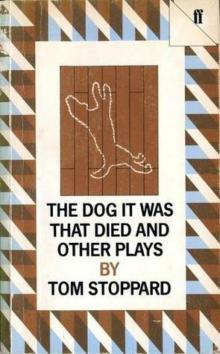 The Dog It Was That Died and Other Plays
The Dog It Was That Died and Other Plays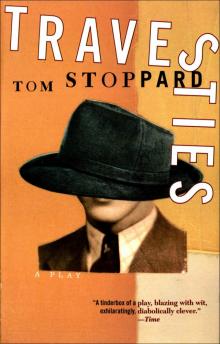 Travesties
Travesties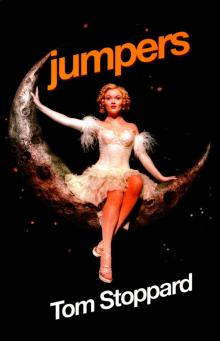 Jumpers
Jumpers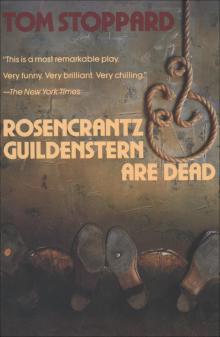 Rosencrantz and Guildenstern Are Dead
Rosencrantz and Guildenstern Are Dead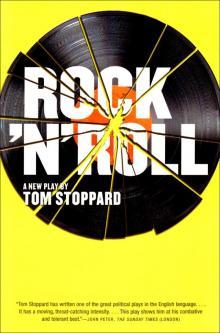 Rock 'N' Roll
Rock 'N' Roll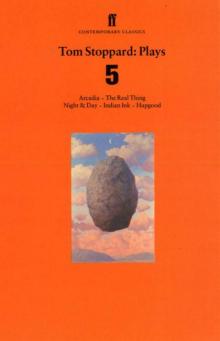 Plays 5
Plays 5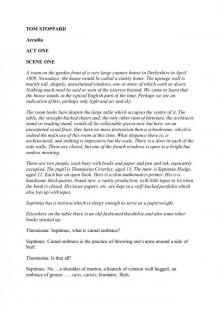 Arcadia
Arcadia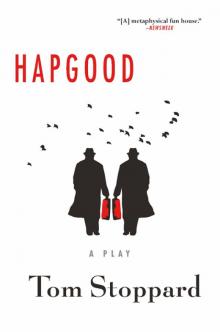 Hapgood
Hapgood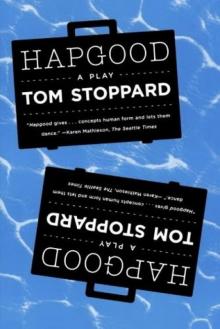 Hapgood: A Play
Hapgood: A Play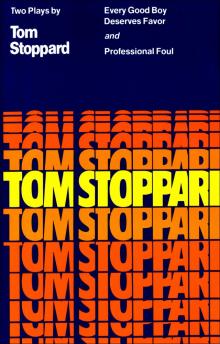 Every Good Boy Deserves Favor & Professional Foul
Every Good Boy Deserves Favor & Professional Foul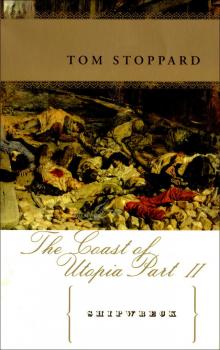 The Coast of Utopia: Voyage, Shipwreck, Salvage
The Coast of Utopia: Voyage, Shipwreck, Salvage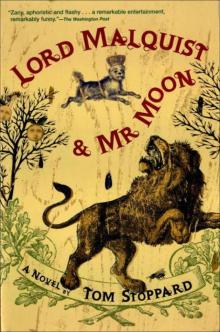 Lord Malquist & Mr. Moon
Lord Malquist & Mr. Moon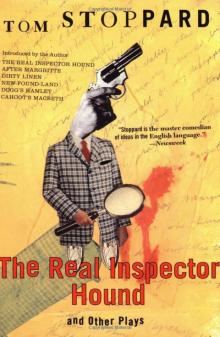 The Real Inspector Hound and Other Plays
The Real Inspector Hound and Other Plays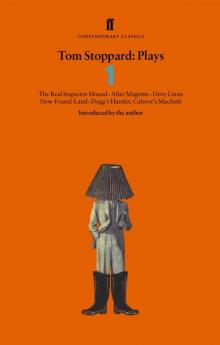 Tom Stoppard Plays 1
Tom Stoppard Plays 1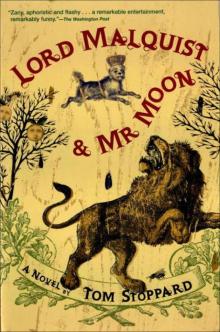 Lord Malquist & Mr. Moon: A Novel
Lord Malquist & Mr. Moon: A Novel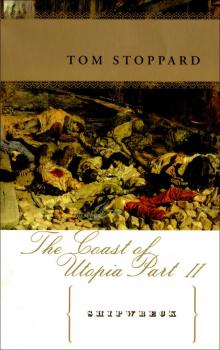 Shipwreck
Shipwreck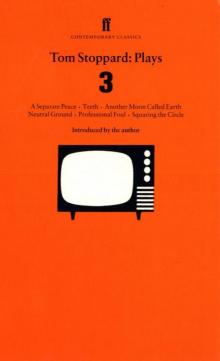 Tom Stoppard Plays 3
Tom Stoppard Plays 3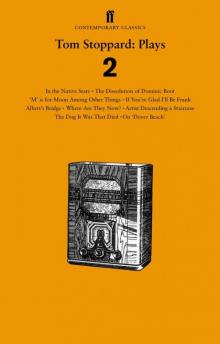 Tom Stoppard Plays 2
Tom Stoppard Plays 2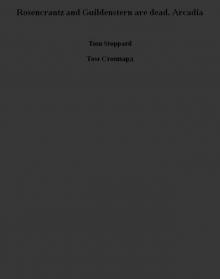 Rosencrantz and Guildenstern are dead. Arcadia
Rosencrantz and Guildenstern are dead. Arcadia